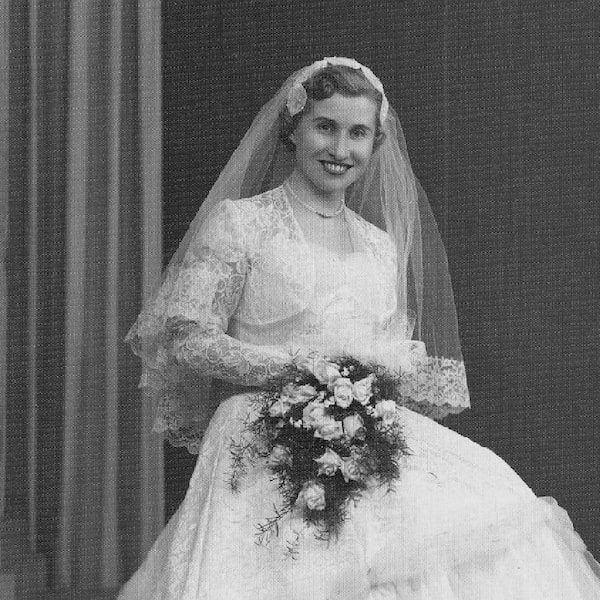
Olena (Helen) Chyczij.Courtesy of family
Olena (Helen) Chyczij: Mother. Grandmother. Volunteer. Survivor. Born Dec. 25, 1929, Buchach, Ukraine; died March 21, 2020, in Toronto, of complications of Parkinson’s disease; aged 90.
Olena never looked more beautiful than on her wedding day. It was one of the few occasions that she allowed herself to be unabashedly photographed. The photographer captured the image of a joyous young bride on the precipice of a new life in Canada. In later years, family albums would be full of photographs of her avoiding the camera, because that is how she lived her life – out of the limelight, putting others before herself, despite the hardships she encountered.
At a young age Olena responded to the discrimination and oppression of Polish-occupied western Ukraine with a stubborn pride, refusing to dance the Polonaise, a national Polish dance. Her childhood was cut short by the Second World War during which Ukraine was subjected to two more occupations – first Soviet and then Nazi Germany. When the defeat of the Nazis paved the way for a return of Soviet terror to Ukraine, millions fled to western Europe.
Olena, along with her parents Danylo and Irena, younger brother Lev, and grandfather Illya were among them. They found themselves in a labour camp in Ellwangen, Germany where Olena was forced to work in a munition factory. Exposure to heavy metals in the factory may have predisposed her to Parkinson’s disease, which she battled in her later years. In between shifts, Olena was the sole caregiver for her younger brother, sheltering him and her grandfather during allied bombing raids.
At the end of the war, Olena’s extended family was reunited in a displaced persons camp in Landeck, Austria. The joy of reunification was short lived, as Lev and Illya succumbed to diphtheria and Olena was hospitalized with scarlett fever. The agonizing deaths of eastern Ukrainians, who drank wood grain alcohol rather than face forcible repatriation to the Soviet Union where their fate was execution or deportation to the Gulag, haunted her until the end of her life.
Eventually, Olena and her parents immigrated to Toronto, where she met Mykola Chyczij at the wedding of mutual friends. They married and raised three daughters, Alexandra, Irena and Marta. In 1977, Olena was widowed at 48. Undaunted, she continued to provide stability and security for her children.

Olena on her wedding day in 1954.Courtesy of family
Olena was determined that her daughters’ education would not be interrupted as hers had been because of the war. Olena constantly chased them out of the kitchen, insisting that they read or study instead. She knew that culinary skills could be more easily acquired than formal education. She was immensely proud when they all achieved professional designations, although she would never openly admit it, lest it go to their heads.
Despite the interruption in her education, Olena built upon her innate mathematical skills by taking night courses and worked for many years as a bookkeeper. She also provided tax filing assistance to family, friends and neighbours.
Olena instilled in her grandchildren, Tynia, Pavlo and Kassandra, a love for their Ukrainian culture, spending time with them at the family cottage at Cawaja Beach and hosting weekly Sunday lunches after church. She was not above resorting to trickery to ensure that they learned to speak Ukrainian by pretending not to speak English. They were genuinely shocked when, accompanying her to a store for the first time, they learned that indeed, Baba spoke English!
Olena was a volunteer in several Ukrainian Canadian community organizations, including Plast, the Ukrainian scouting organization she first joined in the DP camp. Plast recognized her volunteer work with the St. George Medal. She was secretly pleased by the recognition but refused to attend the presentation ceremony – it would have meant one more camera to dodge.
Olena left us in the early days of the pandemic. She had seen this movie before and the prospect of a lockdown and separation from her loved ones was more than her spirit could bear.
Alexandra Chyczij, Irena Soltys and Marta Chyczij are Olena’s daughters.
To submit a Lives Lived: lives@globeandmail.com
Lives Lived celebrates the everyday, extraordinary, unheralded lives of Canadians who have recently passed. To learn how to share the story of a family member or friend, go to tgam.ca/livesguide